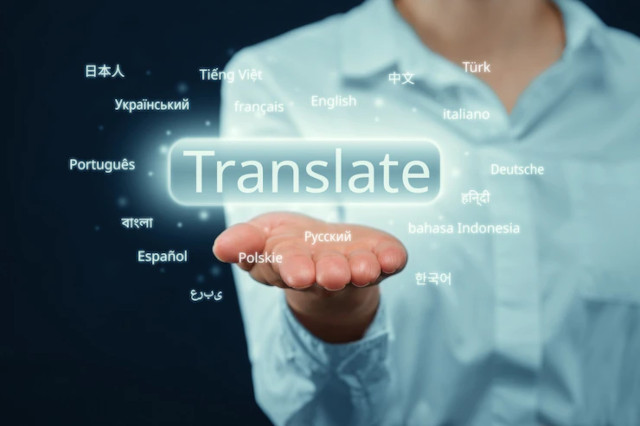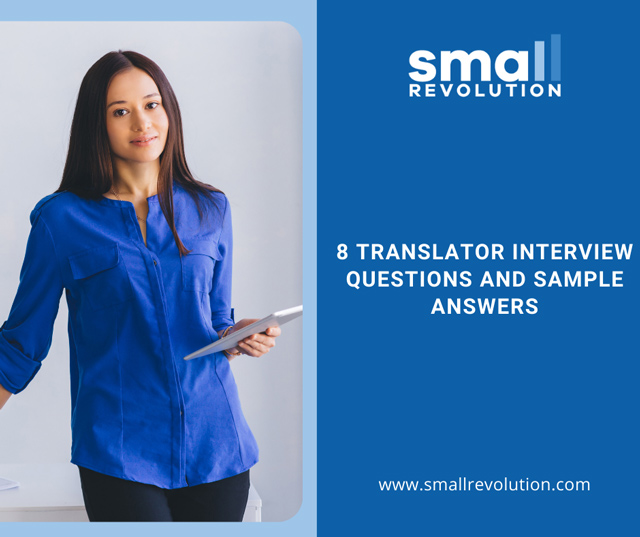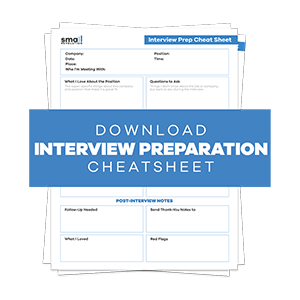Job interviews can be intimidating because many unknowns are involved.
But, provided you’re well-prepared, interviews present an excellent opportunity to showcase your confidence and professionalism, proving you’re the right candidate for the job.
A great way to exude confidence is to practice for your interview beforehand. So, grab a loved one and go through these five translator interview questions:
- Which language(s) are you proficient at?
- Which translation tools are you familiar with?
- Why do you want to work for a translation agency?
- Which area(s) of translation do you specialize in?
- How many words per hour can you translate?
We cover sample answers, including additional interview tips, and give you actionable ideas of what to expect on the day.
Don’t copy these sample answers word-for-word.
You know your skills and qualifications better than anybody else. Therefore, personalize your responses to best demonstrate your skills and passion for translation work.

1: Which Language(s) Are You Proficient At?
Being bilingual does not automatically qualify you as a professional translator.
Therefore, interviewers ask this question to gauge whether your degree of language proficiency goes beyond providing direct translations.
Interviewers may also ask this question to determine your familiarity with a broad range of dialects and accents in your chosen languages. This is mainly if the company often works with clients who speak specific regional dialects.
Sample Answer: “I am proficient in Spanish and Japanese. I am also familiar with cultural references and phrases, including idioms unique to both languages. My excellent eye for detail and writing skills mean that I’m careful not to skip crucial details or omit text that would otherwise render a translation inaccurate.”
Pro Tip: If you’ve taken a specialized course, take this chance to credit it. Mention how the course affords you a deeper understanding of grammar, language terminologies, and awareness of Spanish and Japanese cultures.
2: Which Translation Tools Are You Familiar With?
The interviewer wants to see if you’re well-equipped with the right tools, software, or techniques to resolve various translation issues should they arise.
For example, if you were assigned a technical job, would you be able to use specific translation tech tools to complete the task?
Sample Answer: “In addition to using a translation software like Google Translate when experiencing a translator’s block, I also use Translation Memories for project automation. When I encounter design and formatting issues, I rely on Redokun software to convert the data back into the original document.”
Pro Tip: It helps to acquaint yourself with popularly used Computer-Assisted Translation (CAT) programs and relevant translation techniques translators utilize to help refine their work.
3: Why Do You Want to Work for Our Translation Agency Instead of Freelancing?
Hiring managers post jobs on numerous job boards. If they find a suitable candidate like you, they’ll be curious as to what you know about them and why you want to work for them.
Even if the day you sent in your application was the first time you heard of the company, you must give specific details as if you’ve known about them for decades.
Sample Answer: “According to your mission statement, one of your core values is a commitment to customer service. This is a value I also hold in high regard, and I always aim to treat all my clients with utmost respect and dignity.
It’s also been a dream of mine to work with a large, multi-skilled professional translation team where I can bounce off ideas and consult with peers in the same field.”
Pro Tip: Learn about a company by reading its mission and value statements. Doing so may also prepare you to answer questions such as, “How did you hear about us?” or, “How did you hear about the position?”
Please note that employers want to hire an individual who’s intentional in their job hunt and just as proactive in learning more about their potential future bosses.
4: Which Area(s) Of Translation Do You Specialize In?
This question aims to test whether you’re a subject matter expert (SME). The interviewer wants to know whether, as a translator, you’ve narrowed your focus to a specific niche.
Your answer(s) should prove that you can work with diverse clients and even handle sensitive assignments, for example, from the medical and law field.
Sample Answer: “While I’m not limited to what I can do, I have two primary areas of interest. The first being business and finance, specifically marketing, finance, and corporate communications. My second niche interest is literary translations. I can translate songs, fiction and nonfiction books, poetry, plays, novels, literary books, articles, and texts.”
Pro Tip: Base your answer to the top five niches in the translation industry. These are either legal translation, medical, business and finance, industry and technical, or literary translation.
Even if you haven’t specialized in any of the top five niches in the translation industry, use this chance to prove to the hiring manager that you’re working toward being certified.
5- How Many Words per Hour Can You Translate?

This question is based on the average output of translated words per day for a translator who does not use Computer-Aided Translation (CAT) tools.
Translation agencies require their employees to translate between 800 and 3,000 words per day to meet their deadlines. The average translator (depending on the task) will produce anywhere between 400 and 800 finished words in an hour.
Sample Answer: “I can comfortably translate between 8,000 and 3,000 words per day. I would also be happy to take a performance test to demonstrate my translation speed and accuracy.”
Pro Tip: Brush up on your typing skills, including your knowledge in one or two areas of specialization. Being familiar with the sentence structure, terminologies, phrases, and writing style of the language you’re translating will help increase your translation speed.
Additional Interview Tips
Tip #1- Body language is critical when communicating confidence during an interview. So:
- Maintain eye contact to project confidence.
- Sit up straight, arms neatly folded on your lap to convey a friendly, open attitude.
- Speak calmly, addressing each question, one point at a time to avoid rambling.
- Fidgeting can be interpreted as nervousness. Be aware of your nervous tics well before the interview.
Tip #2- Check out the company’s website and social platforms on employee dress code and work culture. This will guide your choice of an interview outfit and how to carry yourself.
Tip #3- When an interview question is complex, or you need a second to compose your thoughts, buy yourself some time by saying,
“That is a good question. Give me a second to think about it.”
Even better, ask the interviewer for clarification where the question is unclear instead of giving vague responses.

Was Your Interview a Hit or Miss?
The table below demonstrates strong signs of a successful job interview.
| During the Interview | Hit | Miss |
| Interviewer used positive key phrases such as “next time we contact you” or “when you start this position” | ✔ | |
| The interviewer came across as visibly unimpressed or closed off throughout the interview | ✘ | |
| Your follow-up email was answered immediately and you received a positive response | ✔ | |
| Your interviewer went into the specifics of the position by talking about company policies, perks, and benefits | ✔ | |
| The hiring manager contacted the references on your resume | ✔ | |
| Salary expectation for the translation position was discussed | ✔ | |
| The interview ended way too early | ✘ | |
| There were no major concerns such as job inexperience, lack of education, or gaps in employment history | ✔ |
Frequently Asked Questions
Can I increase my chances of landing the translator job?
Yes. You can send a follow-up thank-you email to express your gratitude for the interview consideration while reiterating your interest in joining the company soon.
How should I address an inappropriate question(s)?
Instead of getting offended, you can say something to the effect of:
“Respectfully, I assure you, nothing about my personal life or status will get in the way of performing my job to the best of my ability.”
What should I do as the interview comes to a close?
You can ask the interviewers relevant questions about the job position or the company. Alternatively, ask the hiring team about the next step in the process.
How should I proceed if the translator job interview didn’t go well?
Despite the interview outcome, it’s a sign of maturity to send a follow-up email thanking the interviewer for their time and consideration.
Also, consider asking the hiring manager for feedback on what went wrong and the areas you should improve for positive outcomes in the future.
Don’t be afraid to fail. Don’t waste energy trying to cover up failure. Learn from your failures and go on to the next challenge.
H. Stanley Judd
Practice Makes Perfect.
Now that you have an idea of the types of questions to expect, use the provided sample answers to prepare for a successful interview session.
Also, check out this YouTube video.
It highlights some practical pre-interview insights, including how to find helpful information about the company you’re interviewing with.
Remember, you should also use the interview to gauge whether you would like to work for the translation company or not.
Should you need to explore an ever-changing job landscape, there’re plenty of learning opportunities at Small Revolution. With a bit of knowledge and a curious mind, you may uncover new promising career opportunities.
Good Luck.
Share on Facebook:



